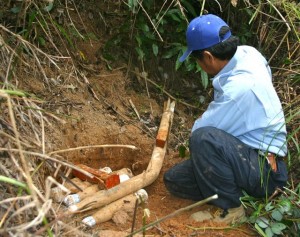Project Phongsali 2011: We need cooperation. When a demolition is delayed people are at risk.

As soon as our Team Leader set the charges we want to proceed with the demolition. We worry that during a delay a villager might wander into the danger zone. Better that we complete the task promptly while we are confident that we have control of the site.
Week Six
Day Thirty-Six:
Rarely do we not get full co-operation from villagers when we have to move people and their possessions around to assure safety during a demolition. Once, in Khammouan Province we had to control the movements of over 500 people for most of a day while experts worked on a 750-pound bomb that was inconveniently located under a house. People in that house, as well as residents of several nearby households, had to move everything they owned, lock, stock and barrel, out of the house for the day. No one complained; everyone complies. Were I in their situation my face would have been a map of misery and I’d have shared my discomfort with anyone who would listen.
Sometimes, people who’ve never witnessed a demolition don’t grasp the meaning of our commands and will make poor choices. We’ll tell people to move to a safer location and they’ll step back ten feet. Or, we’ll tell people to go inside a safe structure and they’ll walk past a concrete building and duck inside a flimsy house made of woven bamboo panels.
Many times I’ve heard sentries tell people, “Get under cover in case something falls from the sky”, and then seen a villager stand in place, covering the top of his head with his hands.
Levels of formal education vary from nation to nation, and conveyed wisdom from culture to culture, but stupidity has no bounds. Once, we were about to trigger a demolition when two British tourists arrived on bicycles. We called to them in English, “Everyone under cover, we’re about to explode a bomb!” They looked at all the rest of us (pressing our bodies against a cement wall and ducking our heads under the relative safety of the building’s tin roof) and asked,
“Us too?”
Luckily, people quickly learn the drill and by the time they’ve been in the vicinity of two or three demolitions, move calmly, quickly, knowingly, to safety.
Today was one of the rare occasions when someone was openly scornful, even defiant, of our procedures. We were doing a demolition near a temporary construction camp that consisted of not much more than a big canvass tent, a water tap, a cook fire, and some piles of building material. The workers at the site, whom we’d seen earlier in the day, were inside the tent sleeping off lunch.
Our sentries shouted their standard alarm through their megaphones and three men spilled out of the tent and took proper shelter with us behind our truck. Vilasak attached the firing cable to the exploder and radioed to the sentries, asking them to make one final check of their assigned areas and to radio back when all was clear. We were seconds from triggering our blast.
Only then did the three workers with us at the firing point tell us that a fourth man was still in his bed. Vilasak, Yai and the workers all began shouting in chorus for the guy to join us. Eventually the young man, perhaps eighteen or twenty years old, emerged from the tent, an impish grin on his face. But instead of joining us at the truck he yawned, stretched his arms and rolled his head, theatrically communicating that he needed to shake off sleep and limber up a bit.
Yai again called for the man to join us. Instead, the fellow walked in the opposite direction, to the water tap, where he proceeded to wash his face and brush his teeth. Clearly, he was letting us know that he was in control of the demolition and that it would proceed only when he chose to cooperate.
After still more stalling, the guy finally relented to Yai’s pleading and joined us at the truck. But… unlike everyone else, he refused to kneel and take proper cover. To prove that he wasn’t afraid of shrapnel, he stood towering over the rest of us.
After the demolition, Yai and I confronted the guy. In not particularly polite language (that Yai likely softened in translation) I told him that his jackass behavior (I’ve no idea what Yai did with that reference) had put others at risk. I explained that our standard procedure is to only set our charges when we are certain that all people and animals are out of the danger zone. Then, once the charges are in place, we move quickly to complete the demolition. Any delay is a window of miss opportunity.
I told the guy that, by grandstanding and delaying the dem, he had heightened the prospect that some villager, perhaps a child, might wander into the blast zone.
The fellow took my scolding with a grin and gave no indication that he respected my opinion. But, later in the day when we conducted another demolition in the same area, he came immediately to the firing point and ducked behind the truck like the rest of us. My bet is that his workmates had a word with him and set him straight.
